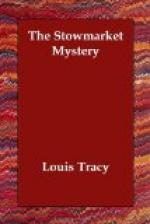“Oh, Winter, Winter! Come to me twice a week from six to seven, Tuesdays and Fridays, and I will give you a night-school training. Now, I wonder if that type-writer has been repaired?”
The detective had seldom seen Brett so thoroughly roused. His eyes were brilliant, his nose dilated as if he could smell the very scent of the anonymous scribe.
“An illiterate man,” he repeated, “in evening dress; the same height and appearance as Hume; in a village like Sleagill on a New Year’s Eve; four miles from everywhere. Was ever clue so simple provided by a careless scoundrel! And eighteen months have elapsed. This is positively maddening!”
“Look here, old chap,” said Hume, still smarting under the recollections of Brett’s caustic utterance, “say you forgive me for keeping that thing back. There is nothing else, believe me. It was for Helen’s sake.”
“Rubbish!” cried the barrister. “The only wonder is that you are not long since assimilated in quicklime in a prison grave. You are all cracked, I think—living spooks, human March hares. As for you, Winter, I weep for you.”
He strode rapidly to and fro along the length of the room, smoking prodigiously, with frowning brows and concentrated eyes. The others did not speak, but Winter treated Hume to an informing wink, as one might say.
“Now you will hear something.”
CHAPTER IX
THE KO-KATANA
Thinking aloud, rather than addressing his companions, Brett began again:—
“The man must have had some place in which to change his clothes, for he would not court attention by walking about in evening dress by broad daylight He met and spoke with Alan Hume-Frazer that afternoon. The result was unsatisfactory. The stranger resolved to visit him again at night—the night of the ball. In a country village on such an occasion, a swallow-tailed coat was a passe-partout, as many gentry had come in from the surrounding district.”
“Yes, that is so,” broke in Hume.
Brett momentarily looked through him, and the detective shook his head to deprecate any further interruption.
“He could not enter Mrs. Eastham’s house, for there everybody knew everybody else. He could not enter the library of the Hall, because the footman was on duty for several hours. Is not that so?”
He seemed to bite both men with the question.
“Yes,” they answered.
“Then he was compelled to hang about the avenue, watching his opportunity—his opportunity for what? Not to commit a murder! He was unarmed, or, at any rate, his implement was a haphazard choice, selected on the spur of the moment. He saw David Hume leave the dance, and watched his brief talk with the butler. He correctly interpreted Hume’s preparations to await his cousin’s arrival. Did Hume’s sleepiness suggest the crime, and its probable explanation? Perhaps.




